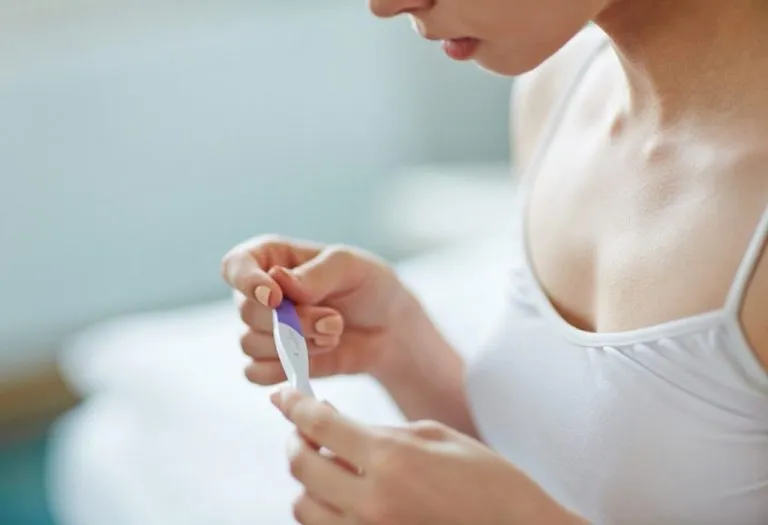Pregnancy Test – When and How to Take

- What Is a Pregnancy Test?
- How Do Pregnancy Tests Work?
- How Accurate Are Pregnancy Tests?
- Can Pregnancy Tests Get Wrong?
- When Should You Test for Pregnancy?
- How Long Does it Take?
- What Are the Different Pregnancy Tests Available?
- Pros and Cons of Taking a Test to Confirm Pregnancy
- What to Do After You Find Out Your Are Pregnant?
- When to Call a Doctor?
- FAQs
Are you trying to conceive and have missed your period? Then the only thing lurking in your mind right now must be whether you are pregnant. This is the most nerve-wracking moment of any woman’s life. Now, all you would want to do is grab a pregnancy test kit and find out the truth! But pregnancy test kits are not always accurate. Some basic steps must be followed to get a reliable result. This article will guide you on how and when to take pregnancy tests at home, and when to visit the doctor to get a confirmation about the arrival of the most awaited member of the family.
What Is a Pregnancy Test?
A pregnancy test is designed to check the level of hCG (human chorionic gonadotropin) in the blood. hCG is a hormone which is secreted by the fertilised egg after it implants itself in the uterine lining. The test can be taken at home with the help of a pregnancy kit, which is available in all drug stores. You can also visit an OB-GYN for the same. If you plan to take the test at home, then you must follow all the steps mentioned in the kit. If you prefer to see an OB-GYN, then he/she will test your blood sample. Please note that a blood test is more accurate than a urine test (1).
How Do Pregnancy Tests Work?
From the moment you conceive, your body starts changing drastically. Your body produces hCG, which doubles every 36 to 48 hours as your pregnancy progresses. This hormone can be detected in your blood as well as urine. The pregnancy test done using a kit works by detecting the level of HCG in your urine. As soon as your urine meets the specially treated strip in the kit, within minutes it shows whether hCG is present in your urine or not. If 2 coloured vertical lines appear in the test area, it means that your test is positive, and if only a single line appears, it means that the test is negative. However, this may vary from kit to kit. Hence, it is always advisable to take a second opinion from your gynaecologist (2) (3).
How Accurate Are Pregnancy Tests?
The accuracy of the test depends upon following the exact directions as mentioned in the test kit. It also depends on testing on the right day and the right time (4). First, you must remember that if you follow the steps mentioned in the kit accurately, then the result is also 99% accurate. But once again, it is always advisable to double-check the result with a blood test through your gynaecologist.
Can Pregnancy Tests Get Wrong?
Pregnancy tests work by detecting the hormone hCG in urine, but various factors can lead to false positives or false negatives. Here are some common reasons why pregnancy test results might be wrong (5) (6):
- Testing Too Early: Taking the test before enough hCG has built up in the body can result in a false negative.
- Diluted Urine: Drinking too much water before testing can lower hCG concentration, making detection difficult.
- Expired or Faulty Test: Using an expired or defective test kit can lead to inaccurate results.
When Should You Test for Pregnancy?
Have you been planning to have a baby and indulging in sex with your partner sans any precautions? And have you missed your periods since then? If so, you should consider the right time to take a pregnancy test to confirm if you’re expecting.
1. What Is the Best Time of the Day to Take a Pregnancy Test?
The best time of the day to take a pregnancy sample is the first urine in the morning. When you sleep throughout the night, your body holds the urine in the bladder for the whole night. This urine is highly concentrated and has high levels of everything, including hCG. Hence, if the urine test for pregnancy is done first thing in the morning, chances are that the result will be 99% accurate (6).
2. What Is the Best Time to Take a Pregnancy Test After a Missed Period?
Taking a test too close to the date of the missed period may give you a false positive, so it is advisable to wait for a week before using your kit. However, if you have regular periods, then you can take the test as soon as you miss your periods.
3. Early Signs That Indicate You Should Perform a Test
Now, you might be wondering how quickly can you take a pregnancy test. Some early signs of pregnancy that can indicate that you should take the test are as follows (7):
- If you notice spotting or light bleeding, then you can consider taking a pregnancy test. This usually happens when the embryo implants itself in the uterus.
- If you feel cramping in the tummy.
- If your breasts feel tender and you get a feeling of discomfort in your breasts while wearing your bra.
- If you feel exhausted all the time.
- If the smell of food and other things around you makes you uncomfortable.
- If your taste buds start longing for food you never liked before, or if you feel aversion towards your favourite food items.
- If you notice excess vaginal discharge along with soreness.
- If you feel constipated most of the time.
These signs show up in the first seven to ten days after ovulation. Take the test if you notice one or more of these symptoms.
How Long Does it Take?
Each home pregnancy test is different, so it’s important to read the instruction manual carefully. It will tell you how many minutes to wait for your result. Typically, most tests provide results within 3 to 5 minutes. An evaporation line can appear if you check your results too late, after the urine has dried (5). Most tests recommend reading the results before 10 minutes to avoid this issue. Be sure to check within the recommended time, as waiting too long may lead to inaccurate results (1).
What Are the Different Pregnancy Tests Available?
Pregnancy tests are of two types, a urine test that you can do at home with the help of the pregnancy kit and the other is a blood test, which is done in a medical centre. Both the tests scan the presence of hCG hormone in your body. hCG a pregnancy hormone that gets produced in the body only once the embryo is implanted in your uterus.

1. Blood Test to Confirm Pregnancy
A blood test is the most accurate way of confirming a pregnancy. Following are the types of blood tests done (8):
a. Qualitative hCG Test
This test is done at a medical centre. This test is usually recommended 10 days after you miss your period. It scans the traces of hCG in your blood sample, and can determine the status of your pregnancy.
b. Quantitative hCG Test
This is a blood test conducted in a medical centre to scan the presence of hCG in your body. This test is more accurate, and traces the exact amount of hCG in your blood. This can detect even the lowest level of hCG during the very early stage of pregnancy.
2. Urine Test to Confirm Pregnancy

A urine test can be done at home, and is very convenient. All you have to do is buy yourself a pregnancy test kit from any medical store, and you are good to do the test all by yourself. These kits come with instructions. Follow the instructions given, and you will most likely get an accurate result. You can do the urine test one week after you have missed your periods, or, if you have regular periods, you can do it as soon as you miss your periods.
a. What’s the best time to do this test?
While you can do the urine test any time during the day, the morning time, as soon as you get up, is the best time to perform the test. This is because the first urine of the morning is highly concentrated, and the chances of getting an accurate result are higher (9).
b. How long does the test take to work?
It takes about 5 to 10 minutes for the urine test to work. Any result that you read after 10 minutes can be misleading. Also, don’t look for a result before 5 minutes have passed. That will be inaccurate, too.
c. What does a positive pregnancy test look like?
When a second line appears along with the control in the pregnancy test stick, it means that you are pregnant. In some test kits, there will be 2 separate windows, and in case of a positive result, lines will appear in both the windows. Please note that the same result must be confirmed with a blood test at a medical centre.
d. What does a negative test look like?
In case of a negative result, only the control line appears, and nothing else. You can repeat the test one week later to confirm this result, or visit your doctor and get a blood test done (10).
e. What about a faint line?
A faint line means that the amount of hCG hormone in the blood is very less. This is quite acceptable during early pregnancy. The concentration of hCG increases in the body as the pregnancy gets older.
Pros and Cons of Taking a Test to Confirm Pregnancy
While pregnancy test kits are quite popular and easily available these days, it helps to weigh the pros and cons of using one.
Pros:
- A pregnancy test is the fastest way to confirm if you are pregnant or not, after you miss your menstrual cycle.
- In scenarios where you were not ready to conceive, but had a birth-control failure, you can confirm your pregnancy status through a pregnancy test.
- Sometimes, in case of early pregnancy symptoms, you may get close to accurate results 4 to 5 days prior to missing your cycle, through the pregnancy test.
Cons:
- Sometimes, the result of the pregnancy test done using a kit can be misleading.
- In many cases, chemical pregnancies appear positive on the kit, but later lead to a miscarriage. In other cases, the results appearing as negative in the pregnancy kit have turned out to be positive later.
It is advisable to get a pregnancy blood test done after the pregnancy test at home for a confirmed result.
What to Do After You Find Out Your Are Pregnant?
Finding out you’re pregnant can be an exciting and overwhelming moment. Whether the pregnancy was planned or unexpected, it’s important to take the right steps to ensure your health and well-being. Here are some key things to do after confirming your pregnancy:
- Visit your doctor to confirm the pregnancy, estimate your due date, and discuss prenatal care.
- Begin taking prenatal vitamins with folic acid to support your baby’s development and maintain a healthy diet.
- Avoid alcohol, smoking, and excessive caffeine, and focus on staying active and stress-free for a healthy pregnancy.
When to Call a Doctor?
It’s important to know when to call your doctor during pregnancy to ensure both your health and your baby’s well-being. While some symptoms are normal, others may require medical attention. Call your doctor if you experience:
FAQs
1. What if no lines appear on the test?
If no lines appear on the pregnancy test stick, then the test will stand invalid. In most of these cases, the problem is with the kit itself. To be on the safer side, repeat the test after 2 to 3 days.

2. When does the test need to be repeated?
In cases where a faint second line appears on pregnancy test kit, or no lines appear at all, then a repeat test may be required to be sure.
3. What does 99 percent accuracy mean?
When a second line appears distinctly on the kit, then it is 99 percent confirmed that you are pregnant. 99 percent accuracy means, if the test were repeated 100 times (with a kit from the same brand/company), it will give a correct result 99 times. There is a 1 in 100 chance that the test gives an incorrect result.
4. Does taking medication affect the result of a pregnancy confirmation test?
Yes, taking medication does affect the result of the pregnancy confirmation test. As discussed before, in order to be absolutely sure, a home pregnancy test or a urine test must be followed by a blood test at a medical centre (9).
All pregnancies are different, and so are the circumstances. This article will help you to determine the status and circumstance of your pregnancy.
References/Resources:
1. Cleveland Clinic – Pregnancy Tests
2. NHS – Doing a pregnancy test
3. Pregnancy test – Icahn School of Medicine at Mount Sinai
4. PubMed – Pregnancy tests: a review
5. Pregnancy Help Center – Can a Pregnancy Test Be Wrong?
7. Cleveland Clinic – Am I Pregnant?
8. Office on Women’s Health – Knowing if you are pregnant
9. The Ohio State University – When is the best time to take a pregnancy test?
10. UNC School of Medicine – Pregnancy Test Instructions
Also Read:
Digital Pregnancy Test
Homemade Pregnancy Test with Shampoo
How to Perform Vinegar Pregnancy Test
How to Confirm Pregnancy Without Taking a Test?
Positive Pregnancy Test But No Symptoms – Is it Possible?
Was This Article Helpful?
Parenting is a huge responsibility, for you as a caregiver, but also for us as a parenting content platform. We understand that and take our responsibility of creating credible content seriously. FirstCry Parenting articles are written and published only after extensive research using factually sound references to deliver quality content that is accurate, validated by experts, and completely reliable. To understand how we go about creating content that is credible, read our editorial policy here.




































